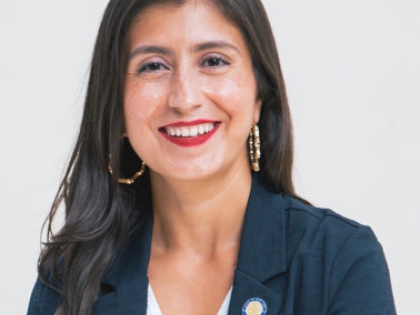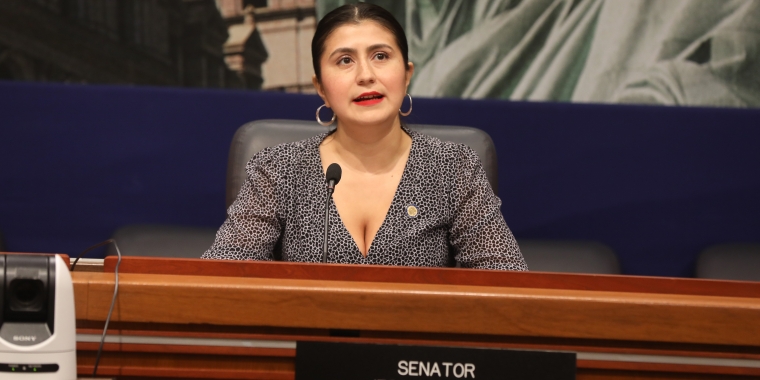
What Happened to Carlos' Law?
Carlos Moncayo, left, was a 22-year-old worker who died on a Harco Construction site that had been repeatedly cited for safety violations. His family, at right, reacted to the court verdict following a criminal trial of Harco's managers.
Why has Carlos’ Law, a popular bill that would vastly help protect the lives of New York City’s construction workers and hold negligent contractors accountable for safety violations, been stuck on the State Senate floor for more than four years?
Council member Francisco Moya, who represents the city’s 21st district, wrote Carlos’ Law in 2016, when he was in the State Assembly; he wanted to hold contractors of the city’s construction sites properly accountable when workers are killed on the job. “The skyline of the city of New York should be built on the sweat—not the blood—of its workers,” said Moya. “Safety should be the number one priority on every construction site, from a two- or- three-family house to a skyscraper.”
Carlos’ Law passed in the New York Assembly in 2017 and is supported by a majority of Senate Democrats, including Senator Jessica Ramos, Senator James Sanders (the bill’s current sponsor), Senator Jamaal Bailey, and Senate Majority Leader Andrea Stewart-Cousins. Yet it has been on and off the congressional agenda for years, and today remains tied up in the Code Committee.
He Couldn't Risk Losing His Job
Carlos’ Law is named for 22-year-old Carlos Moncayo, an Ecuadorean immigrant (and constituent of Moya’s district) who was buried alive at a construction site in New York City’s meatpacking district in April 2015 while working in an unreinforced 13-feet-deep trench that had been cited by safety inspectors.
The contractor responsible for the safety violations that led to Moncayo’s death was Harco Construction, in conjunction with Sky Materials. The managers of the Ninth Avenue site had for months ignored repeated warnings from inspectors that their site was incredibly dangerous. On the morning of April 6, 2015, according to the New York Times, an inspector visited the site, noticed a trench without proper earth-retaining equipment, and issued a warning. Mere hours later, the walls of the trench collapsed on Moncayo, who was pronounced dead on the scene.
“Carlos was an undocumented immigrant paying to keep his family in their home and to put food on the table,” said Moya, adding that Moncayo was hesitant to climb into the trench, but couldn’t risk losing his job. “They threaten him, he gets in there, and within a few minutes the whole thing collapses and he dies.”
The Penalty for Causing a Death: A Small Fine
The Occupational Safety and Health Administration (OSHA) fined Harco approximately $10,000 (the maximum fine possible) for this negligence. Moncayo’s death sparked some public scrutiny and eventually Harco was convicted of manslaughter in the second degree, criminally negligent homicide, and reckless endangerment; a contractor facing so many consequences was a surprise to the industry. But despite these criminal convictions, the Moncayo family, who faced the tragic loss of a son and brother, reportedly did not receive any compensation.
Manhattan District Attorney at the time, Cyrus Vance, said a maximum fine of $10,000 "does not meaningfully deter companies from this type of misconduct. For companies like Harco Construction, $10,000 is Monopoly money."
“Everybody is looking to make the most money possible,” said Senator Jessica Ramos, who has represented New York’s 13th district since 2018, of the current climate of the non-union construction space. “Unfortunately, that is done on the backs of day laborers.” Ramos, who has been encouraging Carlos’ Law reintroduction to the Senate, was an early supporter of the bill, in part due to her personal connection to the cause. Growing up in Queens, she saw many of her peers lose their fathers in construction accidents. “It’s not a situation that’s foreign to me, and it’s grossly unfair that while my friend grew up without her father, the contractor behind that project is living it up in Manhattan,” she said.
Indeed, the backbone of Carlos’ Law is about rejecting inequality and valuing human lives. “We want these lives to be respected and ensure that no one is treated on the job as if they're disposable,” Ramos explained, adding that her district has been “heavily impacted by unscrupulous contractors who look to cut corners on safety in order to save a few cents” in recent years, even during the pandemic. “They put greed over the safety of human beings,” she said.
Carlos’ Law ultimately seeks to bestow between $500,000 and $1 million worth of fines upon companies whose safety violations lead to workers dying on the job. This is a stark difference from the aforementioned maximum fine of $10,000 that contractors currently face with ease. Holding at-fault construction companies responsible for worker deaths through harsher penalties would drastically change the landscape of New York City’s construction industry. Carlos’ Law, according to the New York State Senate’s overview of the bill, would name worker endangerment as third-, second-, and first-degree felonies. “In writing this bill, I wanted to bring justice to Carlos Moncayo, his family, and every single brother and sister that we have lost because of those who chose profits over people,” said Moya.
The Penalty for Causing a Death: A Small Fine
The Occupational Safety and Health Administration (OSHA) fined Harco approximately $10,000 (the maximum fine possible) for this negligence. Moncayo’s death sparked some public scrutiny and eventually Harco was convicted of manslaughter in the second degree, criminally negligent homicide, and reckless endangerment; a contractor facing so many consequences was a surprise to the industry. But despite these criminal convictions, the Moncayo family, who faced the tragic loss of a son and brother, reportedly did not receive any compensation.
Manhattan District Attorney at the time, Cyrus Vance, said a maximum fine of $10,000 "does not meaningfully deter companies from this type of misconduct. For companies like Harco Construction, $10,000 is Monopoly money."
“Everybody is looking to make the most money possible,” said Senator Jessica Ramos, who has represented New York’s 13th district since 2018, of the current climate of the non-union construction space. “Unfortunately, that is done on the backs of day laborers.” Ramos, who has been encouraging Carlos’ Law reintroduction to the Senate, was an early supporter of the bill, in part due to her personal connection to the cause. Growing up in Queens, she saw many of her peers lose their fathers in construction accidents. “It’s not a situation that’s foreign to me, and it’s grossly unfair that while my friend grew up without her father, the contractor behind that project is living it up in Manhattan,” she said.
Indeed, the backbone of Carlos’ Law is about rejecting inequality and valuing human lives. “We want these lives to be respected and ensure that no one is treated on the job as if they're disposable,” Ramos explained, adding that her district has been “heavily impacted by unscrupulous contractors who look to cut corners on safety in order to save a few cents” in recent years, even during the pandemic. “They put greed over the safety of human beings,” she said.
Carlos’ Law ultimately seeks to bestow between $500,000 and $1 million worth of fines upon companies whose safety violations lead to workers dying on the job. This is a stark difference from the aforementioned maximum fine of $10,000 that contractors currently face with ease. Holding at-fault construction companies responsible for worker deaths through harsher penalties would drastically change the landscape of New York City’s construction industry. Carlos’ Law, according to the New York State Senate’s overview of the bill, would name worker endangerment as third-, second-, and first-degree felonies. “In writing this bill, I wanted to bring justice to Carlos Moncayo, his family, and every single brother and sister that we have lost because of those who chose profits over people,” said Moya.

